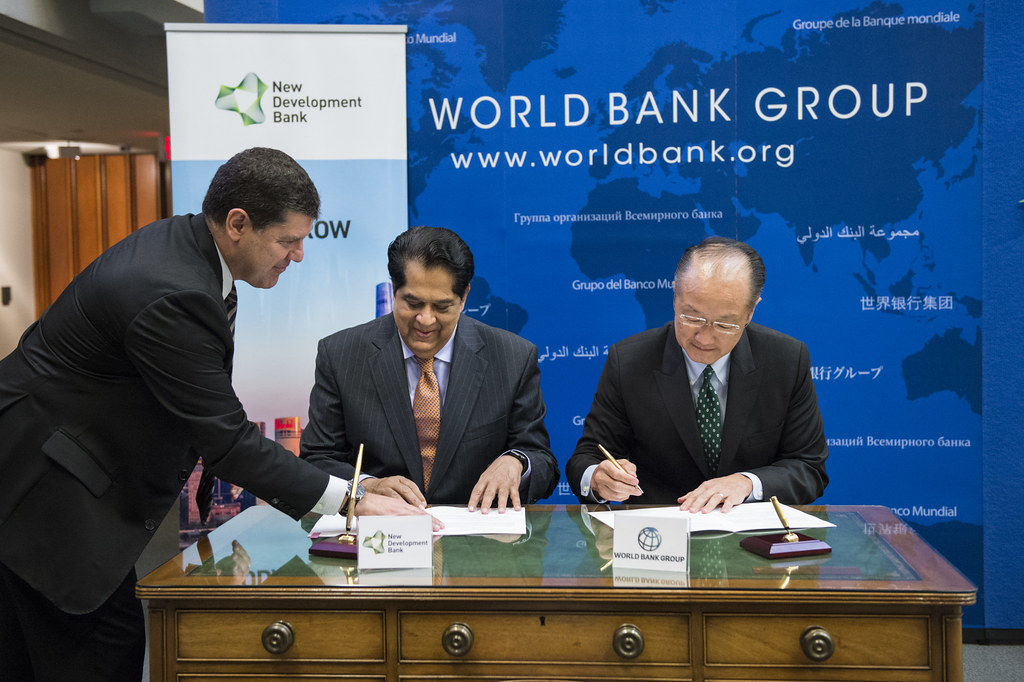HNMUN 2017 Committees:World Bank - Financing Development

World Bank Group and New Development Bank sign memorandum of understanding (Photo: Grant Ellis / World Bank)
The two main goals of the world bank are stated as ending extreme poverty and promoting shared prosperity. It aims to achieve these goals through granting low-interest loans, zero- to low-interest credit and grants to developing countries, assisting them in funding projects in areas such as education, infrastructure, healthcare, public administration, agriculture and environmental resource management.
Scenario 1: Aid conditionality vs sovereignty
Almost all loans from the World Bank are coupled to conditions for the country receiving them. These can range from anti-corruption statutes to specifications in regards to the realization of the funded project. In the case of structural adjustment loans, the loan can even be tied to far-reaching structural adjustments on the national level, such as the privatization of a certain sector.
Even though the number of conditions imposed on World Bank loans has continued to decrease over the past years and their focus has shifted from privatization efforts to questions of public administration the World Bank is still under critique for inferring strongly with national sovereignty with many conditions imposed. Furthermore, studies suggest, that aid conditionality clearly favors better-performing countries over the poorest that would need the loan most.
The committee will have to address the following questions during debate:
• How can aid conditionality be restructured in a fairer way without significantly increasing financial and legal risks for the World Bank?
• How could such an alternative be implemented in the World Bank system?
• How can the World Bank respond if its conditions aren't met? How should this response procedure be standardized?
Scenario 2: Aid fungibility vs sovereignty
The World Bank finances various infrastructure projects in the countries it is active in, like building a new schools or the renovation of a railway. These projects are high priority projects and high return, so in a scenario where the World Bank would not exist, the projects would be on top of the list of actions to be financed by the government of the recipient country. Since the World Bank is stepping in to finance these projects, the parts of the government's budget that would have been allocated to them are now at the free disposal of the recipient government.
If the recipient country is currently actively involved in a conflict, the government may choose to invest the funds into warring activities. In other words, due to the involvement of the World Bank, the recipient country's government could now spend extra funds on arms. This is what is known as aid fungibility.
The committee will have to address the following questions during debate:
• Should the World Bank consider the problem of aid fungibility when financing projects?
• Are the actions of the recipient country's government of concern to the World Bank? To what extent does this fall under national sovereignty?
List of Countries
| Algeria Argentina Australia Brazil Cambodia Central African Republic China Congo (DRC) Ecuador Egypt France Germany Greece India | Iran Israel Japan Kazakhstan Kenya Malaysia Mali Mexico Nigeria Philippines Poland Russia Saudi Arabia Senegal | Singapore South Africa South Korea Spain Sweden Switzerland Turkey UK Ukraine USA Uzbekistan Venezuela |
Further info:
The Study Guide for the World Bank committee is online .
Interested in joining this committee? Just register here!
Committee Chairs: Laura Obenauer, Leonhard Küntzle
